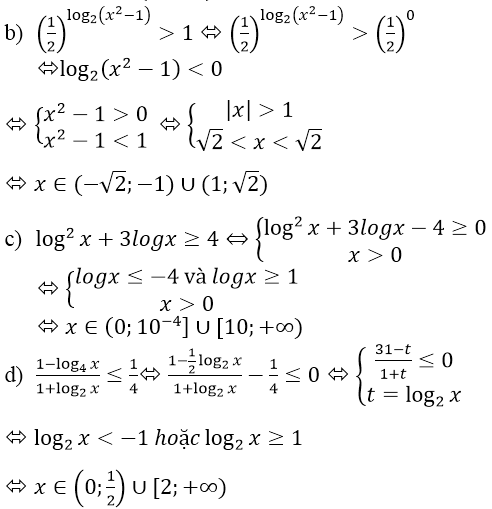Hãy nhập câu hỏi của bạn vào đây, nếu là tài khoản VIP, bạn sẽ được ưu tiên trả lời.

Đặt \(f\left(x\right)=\left(\frac{1}{6}\right)^x+2\left(\frac{1}{3}\right)^x+3\left(\frac{1}{2}\right)^x\)
Nhận thấy f(2) = 1. Mặt khác f(x) là tổng của các hàm số nghịch biến trên R. Do đó f(x) cũng là hàm nghịch biến. Từ đó ta có :
\(f\left(x\right)<1=f\left(2\right)\Leftrightarrow x>2\)
Vậy tập nghiệm của bất phương trình là
\(D=\left(2;+\infty\right)\)

Nhận xét rằng \(\sqrt{5}-2=\left(\sqrt{5}-2\right)^{-1}\)
Do đó bất phương trình có thể viết thành :
\(\left(\sqrt{5}-2\right)^{x+1}\ge\left[\left(\left(\sqrt{5}-2\right)^{-1}\right)\right]^{x-3}=\left(\left(\sqrt{5}-2\right)^{3-x}\right)\)
\(\Leftrightarrow x+1\ge3-x\)
\(\Leftrightarrow x\ge1\)
Vậy tập nghiệm của phương trình là :
\(D\left(1;+\infty\right)\)

Ta có : \(f\left(x\right)=\frac{1}{2}5^{2x+1}\Rightarrow f'\left(x\right)=5^{2x+1}\ln5\)
\(g\left(x\right)=5^x+4x\ln5\Rightarrow g'\left(x\right)=5^x\ln5+4\ln5=\left(5^x+4\right)\ln5\)
\(f'\left(x\right)< g'\left(x\right)\Leftrightarrow5^{2x+1}\ln5< \left(5^x+4\right)\ln5\)
\(\Leftrightarrow5^{2x+1}< 5^x+4\)
\(\Leftrightarrow5\left(5^x\right)^2-5^x-4< 0\)
\(\Leftrightarrow-\frac{4}{5}< 5^x< 1=5^0\)
\(\Leftrightarrow x< 0\) là nghiệm của bất phương trình










Ta chú ý : \(x^2+x+1>0\) Logarit cơ số 10 hai vế ta có :
\(xlg\left(x^2+x+1\right)<0\)\(\Leftrightarrow\begin{cases}\begin{cases}x>0\\lg\left(x^2+x+1\right)<0\end{cases}\\\begin{cases}x<0\\lg\left(x^2+x+1\right)>0\end{cases}\end{cases}\)
Hệ thứ nhất vô nghiệm
Hệ thứ hai cho ta nghiệm x<-1